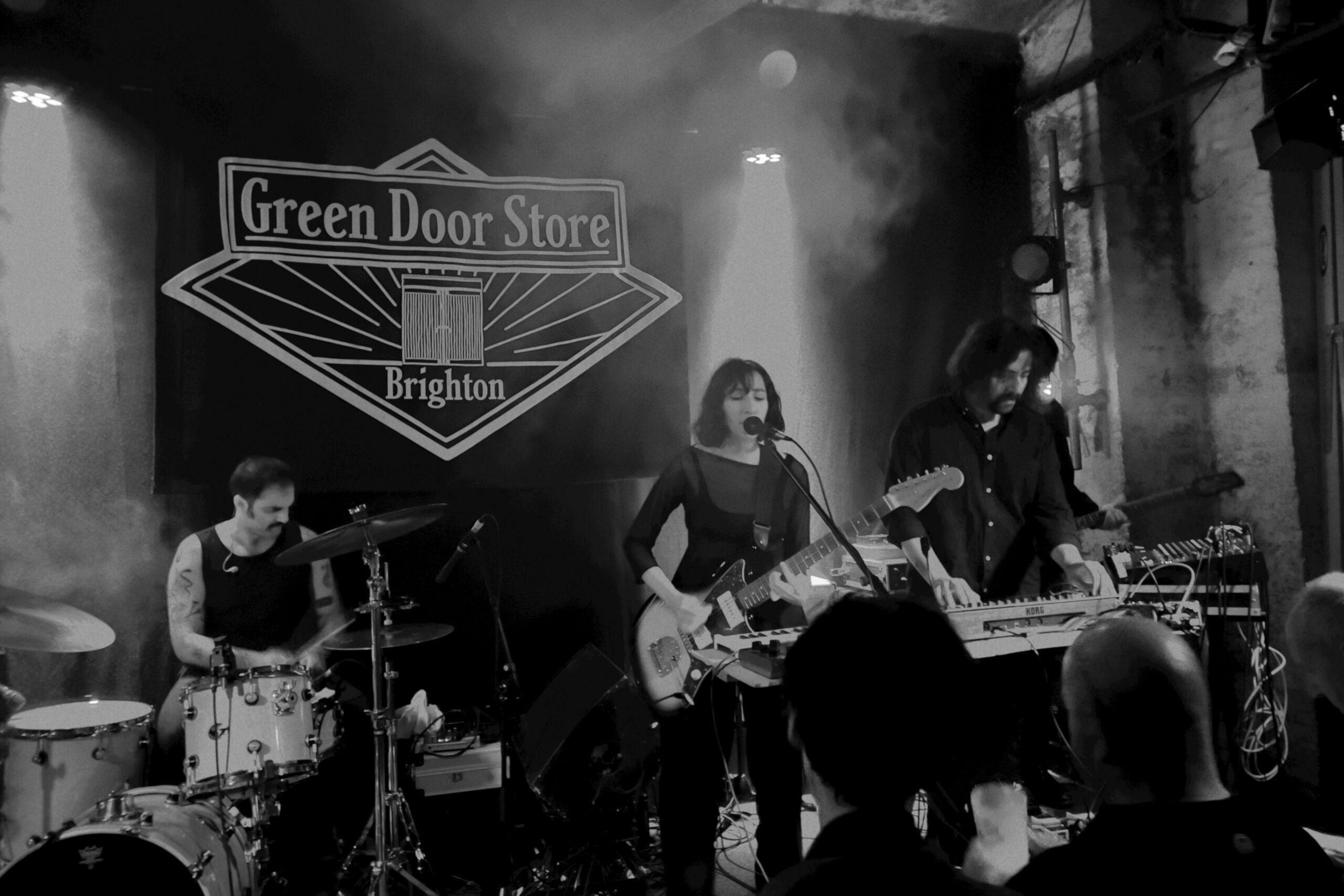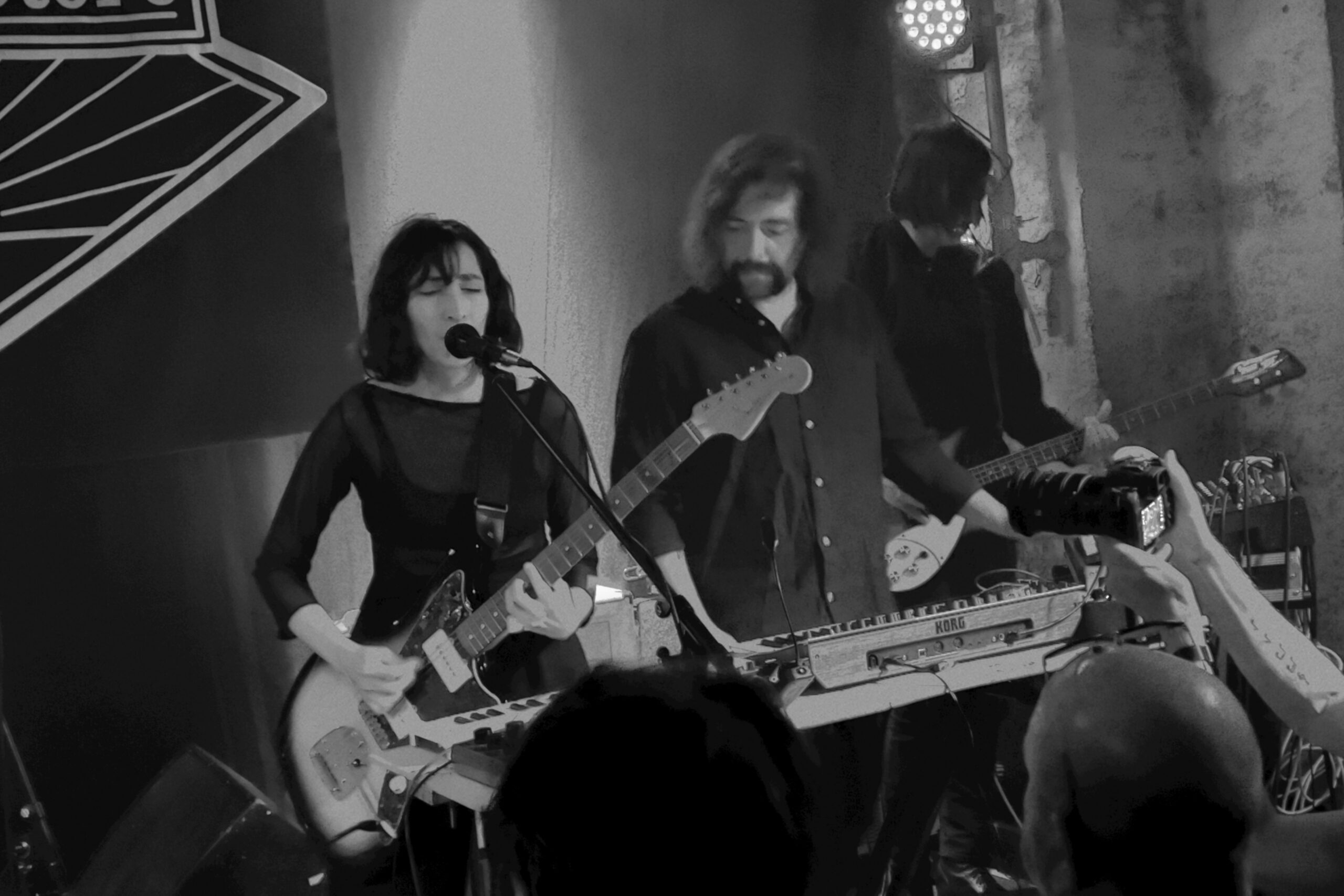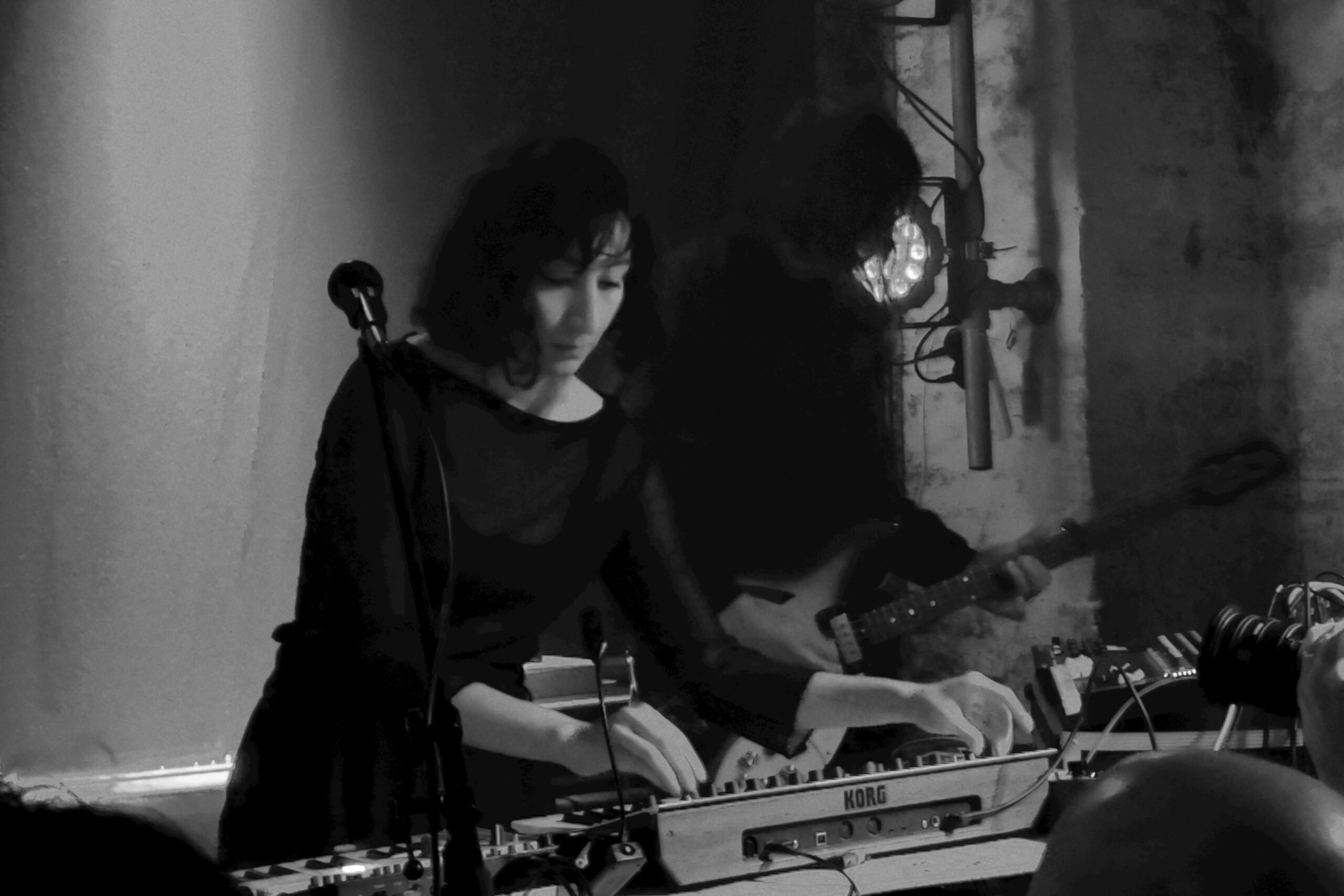Il duo si forma intorno al 2011 a Guadalajara, Messico, in seguito allo scioglimento di rispettivi progetti musicali precedenti.
Nel corso degli anni e con sei album all’attivo, Lorelle Meets The Obsolete ha esplorato e sperimentato trasversalmente la psichedelia, il folk e il biker rock degli anni ‘60, il noise rock e lo shoegaze, e l’avant-garde elettronica.
Lo scorso giugno, la band ha pubblicato Datura (Sonic Cathedral), il loro sesto album registrato nel loro home studio a Ensenada, Baja California, insieme ai musicisti nostrani Fernando Nuti (New Candys) e Andrea Davì (Mamuthones, Orange Car Crash), parte anche della line up live dei Lorelle in Europa & UK. Privo di fronzoli, dall’approccio minimale e nella registrazione e nella produzione, Datura è composto da otto tracce che si ispirano anche al post punk dei The Congos, alla no wave di Ike Yard e all’industrial hip hop di Dälek.
Ho incontrato Lore (Lorena Quintanilla – voce, chitarra, basso e penna della band) e Beto (Alberto González – chitarrista, bassista e all’occorrenza batterista) prima della terza data del loro tour, al Green Door Store di Brighton, per una chiacchierata sull’album, sulla scena musicale messicana e su come il sentimento della nostalgia li faccia inorridire…

[ITA]
Intanto, come va? Come sono andate le prime date di questo tour in Europa e nel Regno Unito? Oggi suonate al Green Door Store a Brighton ed è la vostra terza data.
Beto: Alla grande, non ci possiamo lamentare. L’ultima volta che siamo venuti in Europa è stato nel 2019, prima della pandemia, quindi non avevamo chissà quali aspettative ma il pubblico è stato molto ricettivo.
Lore: Il tour è iniziato molto bene, abbiamo percepito una bella energia da parte del pubblico.
Parliamo un po’ di Datura, il vostro ultimo lavoro. Il nome che avete scelto per il disco è quello di una pianta che cresce nella zona in cui vivete, una pianta che in tanti cercano di strappare (è estremamente velenosa), ma che continua imperterrita a ricrescere. Questa idea di resilienza è tra le ragioni per cui avete scelto questo nome?
L.: Sì, è stata sicuramente una delle caratteristiche della datura che ci ha ispirato di più per il nome del disco. In più, il fiore della pianta sboccia di notte e ci piace pensare che sia una bella metafora per parlare degli artisti e in genere della popolazione messicana. Mi spiego meglio: ci sono tantissime difficoltà che ogni artista deve affrontare, e non parlo solo di questioni finanziarie ma specialmente del colonialismo culturale che pervade in ogni aspetto della nostra vita. Ognuno di noi deve smantellare tutto quello che crede di sapere di sé stesso.
Una volta che comprendi di essere un prodotto del colonialismo culturale puoi essere più critico sulla tua arte e in generale su tutto l’output creativo che proviene da dove provieni te. Ci vuole tempo per riuscire a “sbocciare”, ma noi non molliamo e alla fine ce la facciamo, proprio come la datura.
B.: Esatto, noi sbocciamo di notte come il fiore che dà il nome al nostro album. Ce la facciamo coi mezzi che abbiamo a disposizione. Nel disco parliamo anche molto del contrasto tra giorno e notte, e di come la luce sia sempre vista come una forza positiva, mentre il buio come qualcosa di losco o ambiguo. Tutti i pezzi parlano del sole ma da prospettive diverse rispetto a quelle tradizionali, per cui i fiori che fioriscono di notte – come la datura – sono visti sotto una luce diversa, positiva.
Che rapporto avete con Ensenada, la città in cui vivete? Come ispira la vostra arte? E come riuscite a trovare la forza di andare avanti nonostante le molteplici difficoltà che incontrate in quanto artisti messicani?
B.: Quello che ci ispira di più sono le persone. La scena musicale in cui siamo cresciuti era composta da persone che si supportavano su vari livelli: dal condividere strumenti e backline allo scambio di consigli e informazioni utili, come ad esempio su quali locali approcciare per suonare dal vivo e quali no, eccetera. Tutti noi musicisti dobbiamo tanto alle generazioni che sono venute prima di noi e sarà così anche per quelle che verranno. Dal punto di vista musicale, poi, crescendo a Guadalajara abbiamo avuto modo di condividere il palco con bands che venivano dal noise, dal punk, e perfino dal pop. La scena è sempre stata molto inclusiva e varia – cosa rara in altre città messicane. Ed anche quello ci ha ispirati molto.
Datura è il secondo album che scrivete in spagnolo, dopo aver pubblicato tutti gli altri lavori in inglese. È una scelta per voi naturale durante il processo creativo?
L.: Quando cominciai a scrivere canzoni, l’idea di cantare in spagnolo mi spaventava. Mi sentivo troppo esposta, vulnerabile, data la natura estremamente personale dei testi. L’inglese mi permetteva ed ha permesso di creare un alter ego con cui dire quello che volevo ma con una sorta di filtro. Fin dagli inizi ho provato a scrivere in spagnolo, anche perché le primissime canzoni erano adattamenti di brevi racconti in spagnolo.
Si può dire che il desiderio di scrivere in spagnolo ce l’abbia avuto in testa da sempre, ma solo di recente sono riuscita a trovare il modo di esprimere quello che ho dentro e allo stesso tempo sentirmi protetta; i testi che scrivo sono molto astratti e lasciano parecchio spazio a chi ascolta di interpretarli come vogliono.
Mi considero una persona estremamente nostalgica e quando ho letto che la nostalgia “vi fa senso” mi sono incuriosita… Ditemi di più.
B.: Come artisti, quello che abbiamo fatto in passato ci viene a noia, e cerchiamo sempre di spingerci in territori che non abbiamo ancora esplorato. Ovviamente, guardare al passato è una cosa naturale e la facciamo pure noi, ma quello che ci “fa senso” è il pensiero di restare attaccati ad un ricordo o ad un’epoca, lasciando sfuggire ogni occasione di aprirsi al nuovo. Alcuni nostri amici rimpiangono i tempi in cui vivevano coi loro genitori… E sì, posso capire la sensazione, ma il tempo passa!
Se ti fermi nel ricordo del passato, non riesci ad essere critico. Dicono che il gusto musicale delle persone si sviluppi da teenagers e che da lì in poi i generi che uno preferisce resteranno statici. Da musicista, questa cosa è un po’ inquietante… C’è bisogno di aprire la mente a cose nuove. Ecco cosa mi fa senso!
Siete parte di Sonic Cathedral ormai da quasi 10 anni. Com’è il vostro rapporto con l’etichetta londinese?
L.: Nat è una persona speciale. Questo è senz’altro il rapporto migliore che abbiamo mai avuto con un’etichetta discografica. È come se dal primo giorno ci fossimo promessi di crescere insieme e restare uniti, nella buona e nella cattiva sorte…
B.: Credo che Nat ci abbia dato una struttura che prima non avevamo. Ci preoccupavamo solo di far uscire musica nuova e poi scriverne altra. Con lui, abbiamo capito l’importanza dei video, degli uffici stampa, e cose così. In Messico, le cose sono fatte con un po’ meno ordine, diciamo. Con Nat siamo diventati dei professionisti.
Ci sono colleghi di Sonic Cathedral che ammirate e ascoltate?
L.: Gli Spectres sono pazzeschi. Poi Young Husband e Pye Corner Audio – lo amiamo.
B.: Pearlies, il disco di Emma Anderson (ex Lush) ci è piaciuto molto. E i Whitelands pure. Però ecco, gli Spectres sono stati la nostra band preferita per un bel pezzo perché si spingono fuori dai confini dello shoegaze – sono molto più aggressivi.
Com’è il vostro rapporto con l’Italia? Da qualche anno, nella vostra line up ci sono anche Fernando Nuti (New Candys) e Andrea Davì (Mamuthones, Orange Car Crash).
L.: Qualche anno fa, stavamo cercando musicisti europei con cui suonare, principalmente per cercare di contenere le spese dei tour. Ricordo che chiedemmo aiuto al nostro caro amico Federico Zanatta (ex Father Murphy) che ci presentò Fernando e Dario (Lucchesi) dei New Candys.
Dario ha suonato con noi soltanto un paio di tour, mentre Fernando è sempre parte della line up europea, diciamo. Ci siamo subito trovati benissimo. Andare in tour insieme è più o meno come vivere insieme; ci vogliono rispetto e una buona comunicazione, e con Fernando e poi Andrea (Davì), un batterista sempre consigliatoci da Federico, abbiamo creato una band che funziona in tutti i sensi.
B.: Federico per noi è stato una sorta di mentore. Ci ha sempre dato una mano quando avevamo domande sull’industria musicale.
Cosa avete in serbo per i prossimi mesi? Dopo l’Europa so che suonerete molto in America, e anche al Levitation festival.
L.: I prossimi due mesi saranno belli pieni, anche se purtroppo stavolta non abbiamo concerti in programma in Italia. Saremo nel Regno Unito fino a metà ottobre e poi torneremo in Messico per prepararci alle date in America con la nostra band “locale”. Vorremmo anche fare un paio di concerti in Messico, crediamo a dicembre, anche se ancora non abbiamo fissato le date. Speriamo di arrivarci vivi!

[ENG]
First things first: how are you? Tonight will be your third night on this Europe and UK tour. How are you feeling about it? How were the first two nights?
Beto: It’s been great, we can’t complain. The last time we came to Europe was in 2019, so before the pandemic… We didn’t have any expectations on the first shows but everyone’s been nice. It’s also great to be back in the UK.
Lore: Good energy in the audience, and we had a great start to the tour.
Let’s chat about Datura, your latest album. I love that you named it after a plant growing in the area that you live in, one that people try to get rid of due to its poisonous nature – though it keeps growing back. Is this about resilience?
L.: This was one of the reasons why we picked this name for the album. This flower blooms at night – we were comparing this to musicians living in Latin America – and all people, to be fair – who must face so many difficulties to be able to make it. Every art movement in Mexico struggles to get to the surface not just due to financial difficulties but mainly due to having to confront cultural colonialism.
You have to deconstruct yourself – firstly, you have to realise you are culturally colonised and then you can start being more critical of your art and overall the one that comes from the same places as you. It takes a while to flourish. Our country and culture are very complex, and you have to spend quite a lot of time reflecting on them to be able to fully understand them. But, despite all of these struggles, bands and creatives keep making art.
B.: We flourish at night like daturas. We manage with what we have. We push through. In the record, we talk a lot about darkness and light and make analogies with racism and how we think of the light as the pure and bright side of things, while the darkness is associated with shadiness. All the songs mention the Sun in a different light, so that flowers blooming at night become beautiful, with all their complexities – and not shady.
So, what’s your relationship with your hometown Ensenada? How does it inspire your art and music? How do you find the strength to keep making music, despite all the difficulties?
B.: I think what inspires us the most is looking at how everyone manages to keep going. We grew up in a scene where everyone was sharing instruments and backlines when playing gigs, and apart from a few rivalries, usually, bands share knowledge and tips – for example, which places to avoid or where they give you a good deal, etc. The scene keeps building on the work of previous generations of artists and that’s the greatest thing for me. Musically, everything has been developing in a very interesting way. Back in Guadalajara where we grew up, we would share the stage with noise, punk or even pop bands. It was a very diverse scene there, something quite unusual that you wouldn’t find in many other Mexican cities. And that helped too.
This is the second album you’re writing in Spanish. Would you say is this a spontaneous part of your creative process?
L.: At the beginning, when I started writing lyrics, I felt like it was too personal the content and it was difficult to sing them in Spanish, I felt too exposed, and so writing and singing in English made me feel like I had an alter ego and I could be as open as I wanted and never uncomfortable. I always tried to write in Spanish though, since the very first record.
Actually, my first-ever songs were based on short stories I had written in Spanish – which I then translated into English. So yeah, I have been trying to make it work for a long time and I have finally found the way to be able to do it; I write in such an abstract way that I feel free to express what I feel but at the same time, there is enough space for people to come up with different meanings and interpretations. It took me quite a bit of time to feel safe to do this, but it feels very good. I’m happy as it is now.
I read a quote of yours about nostalgia and it stuck with me, especially as I consider myself to be extremely nostalgic. “There’s something about nostalgia that creeps me out”. Tell me more.
B.: As a band, we always get bored pretty easily with the things we’ve done before. We always try to push further. We obviously need to look back but we feel that nostalgia creeps me out as this feeling often gets you stuck into places where you never question what you’ve done or your beliefs. I see it in some friends – they long for the times when they were living with their parents… I can understand it, but in a way, it’s like “C’mon, you’re no longer a kid!”.
Being stuck in a moment stops you from analysing stuff more critically. You can apply this to a lot of things – to music, of course. I read that people’s musical taste is developed when they’re teenagers – you can surely find out about new bands but you end up craving the same genres. As a musician, this idea is quite creepy to me – where’s the interest in finding new genres and opening your mind to new stuff? Here’s what creeps me out.
You’ve been with Sonic Cathedral for about 10 years now. How’s this time been? I’d like you to talk about the support you’ve found having a label that’s based in the UK.
L.: It’s been great, Nat is great. I think it’s the best relationship we’ve ever had with labels – we had quite a few bad experiences before. With Nat, it feels like we’re trying to grow together in a way. We are committed to each other, in good and bad times (laughs).
B.: I think he helped us make some sense of how we operate as a band. When we started working with him, we would just worry about putting out music, without really worrying about making a video or pushing the news to the press, or stuff like that. In Mexico, things are not that structured when you have a new release. Nat made us more professional, that’s for sure. He’s a great guy.
Are there any fellow bands on Sonic Cathedral that you admire?
L.: Spectres are amazing. Young Husband. Pye Corner Audio – we love him.
B.: Pearlies, the album by Emma Anderson (ex Lush) is also really good. And Whitelands are great, of course. But yeah, Spectres were our favourite band for a long time. They are pushing the boundaries – they’re so noisy, kinda shoegaze-y but in a heavier and aggressive way, which we love.
How’s your relationship with Italy? You’ve been playing with Fernando (New Candys) for quite some time and also had Andrea Davì (Mamuthones, Orange Car Crash) joining you on a few tours in the last years.
L.: It’s great! A few years back, we were looking for musicians in Europe to play with – something we considered doing to cut touring costs – and our good friend Federico Zanatta introduced us to Fernando Nuti and Dario Lucchesi (New Candys) and we went from there.
Dario only played a couple of tours with us. As soon as we started playing with Fernando, we realised we had gotten along very well. When you’re touring, it’s like having a roommate – you have to be respectful in different ways and really feel comfortable. Federico also introduced us to Andrea Davì, another drummer from the same Italian scene and he’s with us now too.
B.: Federico used to play in Father Murphy and he’s played such a key role for us. Every time we had questions about the industry, we would ask him – he’s been a great advisor.
What’s next for you? You’ve got a few juicy gigs booked in the US, including the brilliant Levitation festival…
L.: We’ve got a couple of very busy months ahead, though sadly no shows in Italy this time around. We’ll be in the UK until mid-October, and then we’ll head back to Mexico to rehearse with our other band before touring the US until the end of November. We’re thinking of playing a few shows in Mexico in December but haven’t set dates yet. Hopefully, we won’t collapse halfway through the tour!

LINK
Instagram
Facebook
Twitter
Spotify
SEGUICI
Web • Facebook • Instagram • Twitter • Spotify • Telegram
#music avant-garde elettronica biker rock brighton datura Folk green door store interview Intervista live music Lorelle Meets The Obsolete Mamuthones Messico Musica New Candys noise rock orange car crash Psichedelia Psychedelic Rock Shoegaze Sonic Cathedral
Last modified: 20 Ottobre 2023


















